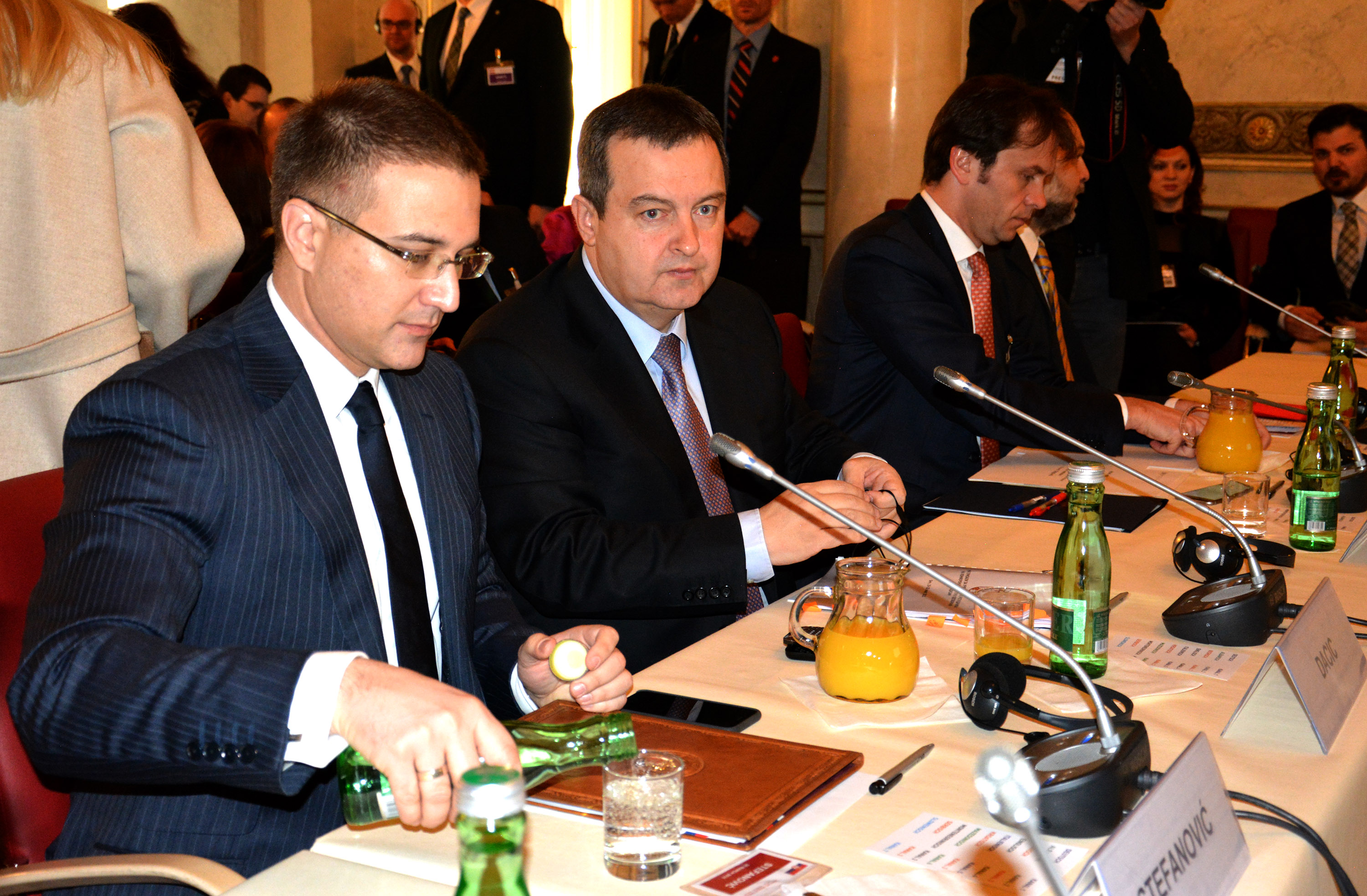



| Friday, 20 March 2015. | |
| Minister attending the Conference “Tackling Jihadism Together” in Vienna | |
| + larger fontnormal font- Smaller font |
 The Conference of Ministers of Foreign and Internal Affairs of the European Union (Austria, Italy, Slovenia and Croatia), as well as the Foreign and Internal Affairs Ministers of the Western Balkans, “Tackling Jihadism Together”, has been co-hosted by Foreign Minister of The Conference of Ministers of Foreign and Internal Affairs of the European Union (Austria, Italy, Slovenia and Croatia), as well as the Foreign and Internal Affairs Ministers of the Western Balkans, “Tackling Jihadism Together”, has been co-hosted by Foreign Minister ofAustria Sebastian Kurz and Interior Minister Johanna Mikl-Leitner, today in Vienna. The Conference discusses the current situation in the fight against terrorism, the potential threat posed by foreign fighters, as well as a range of measures that can be implemented by the EU and the Western Balkans. Below is the remarks made by First Serbian Deputy Prime Minister and Foreign Minister Ivica Dacic at the first panel of the Conference “Tackling Jihadism Together”. “Excellencies, Ladies and gentlemen, Serbia is firmly resolved to respond to modern security challenges, including fight against terrorism, all types of extremism and religious fanaticism, as it is our common task that needs to be addressed promptly. Serbia is committed to contribute - together with its international partners, the EU in particular – to addressing all threats on regional, European and global levels. The complexity of these issues calls for coordinated action and focusing of attention on all aspects of this phenomenon, both nationally and internationally. Serbia has always condemned all forms of terrorism, as well as all types of extremism and radicalism, whoever the culprits, wherever the venue and whatever the motives of their perpetrators and followers. In facing these challenges, the most current ones being reflected in the activities of the Islamic State, Serbia has immediately joined international action, co-sponsored resolution 2178 unanimously adopted by the UNSC and reiterated on several occasions its readiness to intensify cooperation and coordinate activities with all countries within and outside the region. Serbia has been contributing to these efforts also as a member of the Global Coalition against IS. Serbia modified its Criminal Code very promptly in order to prevent departure from, or transit through, its territory by individuals intending to participate in conflicts in other countries, by envisaging provisions making criminal such participation, as well as its organization, incitement and recruitment of foreign fighters. Serbia has been following with particular attention the phenomenon of Jihadism in the world, because dissemination of ideas of radical Islamism and recruitment for jihad in Syria and Iraq have been recorded in its own territory and its closest neighbourhood. Serbia itself is faced with the problem of foreign fighters, that is, with the departure of its nationals headed to fight for IS, mainly through radical Islamic preachers and centres. Most of them are from the Raska area and Kosovo and Metohija. The share of foreign fighters from Serbia is relatively small in proportion to the total number of foreign fighters in IS (approximately 100), although it is not negligible. Countering terrorism and extremism by repressive, military and police measures is not enough. I would like to underline that our today’s panel discussion is very useful in devising complementary measures aimed at affecting the very roots of these phenomena. IS is seeking potential European recruits among citizens of Islamic religion who consider themselves marginalized for a variety of reasons and are therefore an easy target of Islamic fundamentalists. It is extremely important that the citizens of all faiths and political beliefs are integrated into modern society based on common values. This issue is essential in the fight against terrorism, extremism and radicalism. Integration implies also freedom of religious belief and the right to identity, but it also means understanding of people undergoing integration that it is not detrimental to their religion, ethnicity and their other affiliations and heritage. Special attention should be attached to the examination of the role of Islam in today’s European society and fostering the culture of inter-faith dialogue to the effect of promoting understanding and common values. Common responsibility for it lies with the state and its institutions, religious leaders and the society as a whole, so as to prevent fertile ground for fundamentalist goals. In this context, it is necessary to avoid any identification of Islam with extremism and terrorism. For this reason, it is necessary to ensure that, at the same time, particular attention is devoted to fight against islamophobia. Serbia wishes to contribute to all measures taken at the international level to the effect of eradicating extremism and radicalism, and preventing terrorist activities. Every country, irrespective of its size, should have a role to play in accordance with its resources and potentials, since terrorism, extremism and radicalism do not recognize borders. Thank you for your attention.” |